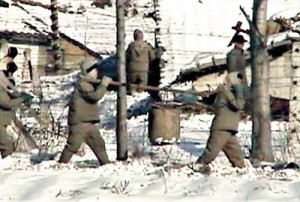Special to WorldTribune.com
By Robert Pak
The author is a Korean-American minister and human rights activist who entered North Korea on Christmas day of 2009 to protest against genocide and crimes against humanity taking place within the country. He is a founding member of the nonpartisan Worldwide Coalition to Stop Genocide in North Korea.
On Nov. 27, the third committee of the UN General Assembly passed a resolution condemning the human rights situation in North Korea. For the first time, this resolution was passed by consensus, suggesting that there are now few or none who doubt the severity of North Korea’s humanitarian and human rights catastrophe within the international community. Even longtime ally China did not seek to vote against the resolution, which was first adopted in 2005, this year.

The resolution expressed concerns about “persistent reports of systematic, widespread and grave violations” of fundamental human rights and North Korea’s use of public executions, torture, illegal and arbitrary detention, concentration camps for political prisoners, the punishing of the relatives of these prisoners, and for draconian restrictions on freedom of expression, religion, thought and movement. It also expressed concern for the rights of North Korean defectors repatriated by China who have been ferociously punished and can be killed for the “crime” of leaving the country.
North Korea, as it has done every year, rejected all of the allegations and effortlessly dismissed the statement as “political terrorism.” But, in truth, the resolution only touches the surface of the humanitarian and human rights emergency within North Korea.
Numerous reports over the last ten years, including from the UN Special Rapporteur on the Situation of Human Rights in North Korea, have determined that North Korea’s exploitative and discriminatory food policy, which has been the primary cause of as many as four million deaths since the mid-1990s, and its inhuman treatment of political prisoners constitute crimes against humanity as defined by the Rome Statute of the International Criminal Court.
In December of last year, Genocide Watch, a non-partisan NGO which exists “to predict, prevent, stop, and punish genocide” and whose board of advisers includes respected anti-genocide activists such as Lt. Gen. Romeo Dallaire and Samantha Power, published a report which found conclusively that North Korea has committed genocide as defined by the UN Genocide Convention, stating that there is “ample proof that genocide has been committed and mass killing is still underway in North Korea.”
At this moment, every method which constitutes genocide as outlined in Article 2 of the UN Genocide Convention is being utilized by the DPRK security apparatus within North Korea’s prison camps, where up to 250,000 innocents, one-third of them children, are being forced to do slave labor on starvation rations and are daily subjected to heinous torture and executions.
In addition, the DPRK is actively targeting for destruction every group which is protected under the Genocide Convention through its decades-long policy of killing the half-Chinese babies of North Korean women forcibly repatriated by China (constituting genocide on national, ethnical, and racial grounds) and through its systematic annihilation of its indigenous religious population and their families (genocide on religious grounds).
In 2006, the late Czech President Vaclav Havel, Nobel Laureate Elie Wiesel and former Norwegian Prime Minister Kjell Magne Bondevik commissioned a report which called for the UN Security Council to adopt a resolution urging open access to North Korea for humanitarian relief and for the release of political prisoners. In an oped for the New York Times the same year, they called on UN Secretary-General Ban Ki-Moon to “make his first official action a briefing of the Security Council on this dire situation.”
This has yet to take place.
Again, in 2009 and 2010, former UN Special Rapporteur on the Situation of Human Rights in North Korea Vitit Muntarbhorn urged for the “totality of the United Nations system, especially the Security Council,” to be mobilized “to take measures to prevent egregious violations and protect people from victimization,” and for an “end to impunity.”
To date, no U.S. administration has meaningfully addressed this genocide, focusing rather on the security threat but without success.
North Korea is at present the world’s worst proliferator of nuclear weapons technology and, according to an Aug. 16 report from The Institute for Science and International Security, is on course to possess up to 48 nuclear weapons by 2015.
Critical opportunities have been missed and time continues to be wasted while masses of North Korean innocents suffer brutality and die.
What is long overdue is for the United States and other members of the world community to bring the matter of crimes against humanity and genocide in North Korea before the UN Security Council and, in all bilateral or multilateral discussions and initiatives on North Korea to now prioritize the fundamental freedoms, rights and lives of the North Korean people.
The writer is a minister, human rights activist and founding member of the nonpartisan Worldwide Coalition to Stop Genocide in North Korea, a non-profit working to provide life-saving resources to victims and their families within North Korea.
